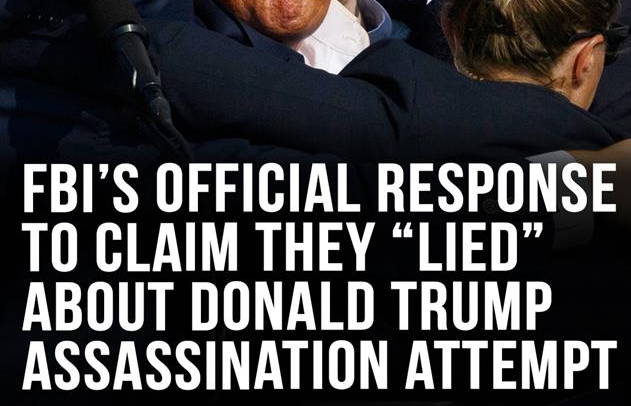The shots that nearly killed Donald Trump didn’t bring an end to the danger; they opened a new battlefield, one fought not with bullets but with competing narratives. What began as a violent act in a crowded street quickly transformed into a war over perception, truth, and trust. Tucker Carlson, the high-profile commentator known for his uncompromising takes, claims the FBI misled the public, deliberately concealing evidence that contradicts the official story. According to Carlson, the bureau’s early framing of the attack painted Thomas Crooks as a quiet, isolated “lone wolf,” someone with no apparent connections, no digital footprint of violence or extreme ideology. But Carlson and his team insist they found online posts, deleted accounts, and digital breadcrumbs suggesting something far darker: a calculated mind, a person immersed in content that should have raised alarms. To him, and to millions of viewers, this isn’t a simple oversight—it feels deliberate, a protective act by a system that shields its own, no matter the cost.
The FBI, for its part, has responded in measured tones, laying out the machinery behind their investigation. Hundreds of agents were deployed, thousands of tips sifted, devices seized and analyzed, social media accounts scrutinized. Every lead, every click, every post that could have hinted at a larger plot was examined. Their conclusion: Crooks acted alone. He shared his plans with no one, had no accomplices, and no broader conspiracy was at play. Officials stress the legal and ethical limits of constant surveillance. Monitoring every citizen’s online life would shred civil liberties in an instant, turning the country into something unrecognizable in the name of safety. From their perspective, the story is clear, methodical, and painstakingly documented.
Yet, in the eyes of the public, the picture is far less tidy. Between Carlson’s claims and the FBI’s explanation lies a widening fissure of distrust. People scroll endlessly, dissecting timelines, screenshots, and statements, each person filtering facts through their own lens of suspicion. For some, the idea that Crooks acted entirely alone seems implausible, that perhaps information was withheld to protect reputations or avoid accountability. For others, the FBI’s warnings about civil liberties carry weight, a reminder that preserving privacy and legal safeguards sometimes requires restraint, even when fear demands certainty.
The backdrop is a nation on edge. A year has passed since Crooks opened fire in Butler, yet the psychological reverberations remain. Politicians speak in careful tones, reporters comb archives for inconsistencies, and every deleted post or vanished file takes on a sinister significance. Social media amplifies every claim, every counterclaim, creating echo chambers where belief often trumps fact. Carlson’s viewers feel vindicated in their skepticism. Every story about government overreach, every secretive investigation, every unexplained bureaucratic action feeds into a narrative that the system protects itself first, and citizens second.
Meanwhile, families of potential victims, and even ordinary Americans, live in quiet anxiety. Was Crooks truly acting alone? Could another attack be imminent? And if the official accounts are incomplete or misleading, how can anyone feel truly safe? The fear is compounded by the modern media landscape, where unverified claims travel faster than official statements. Videos, screenshots, and social media posts circulate endlessly, often without context, leaving people to fill in gaps with speculation, outrage, or panic.
Behind the headlines, the story of Thomas Crooks is less about the shooter and more about society itself. The attack became a prism through which every citizen now examines authority, transparency, and accountability. One side sees a system riddled with incompetence or deceit. Another sees a careful balancing act between security and freedom, one that must tolerate imperfections to preserve the very principles it protects. Both views are informed by fear, mistrust, and the lingering question: what really happened, and who benefits from the story being told one way or another?
Even beyond politics, there’s a human element that’s often overlooked. Investigators spent months piecing together Crooks’ digital life, tracking posts, timestamps, and deleted messages, each fragment representing a life, a mind, and a series of choices that led to a near-tragedy. Analysts debate motivation, context, and the signs that were visible in hindsight but invisible at the moment. Families of those who might have been in harm’s way wrestle with questions of “what if”—what if someone had noticed an early warning? What if the attack had succeeded? What is the cost of uncertainty, and who bears it?
As the debate rages, the nation remains divided. To some, Carlson’s exposé is a vital check on authority, a reminder that vigilance is necessary when power wields secrecy. To others, the FBI’s account is a measured and rational explanation, a reflection of the painstaking work required to avoid panicking a nation or violating rights. And while facts continue to accumulate—new documents, interviews, and analysis—the court of public opinion moves at a pace dictated by outrage, ideology, and instinct, not by careful investigation.
Ultimately, the attack on Donald Trump, the bullets, the chaos, and the narrow escape are only part of the story. Equally important is what followed: a battle over the narrative, a fight to define truth, and a struggle to reconcile fear with evidence. One side claims concealment, another cites transparency. Both claim moral and factual authority, yet neither can fully persuade the other. And in that space, the American public finds itself suspended—watching, waiting, doubting, and questioning everything they thought they knew about trust, authority, and the fragility of certainty in a world where a single gunshot can ignite years of suspicion.
